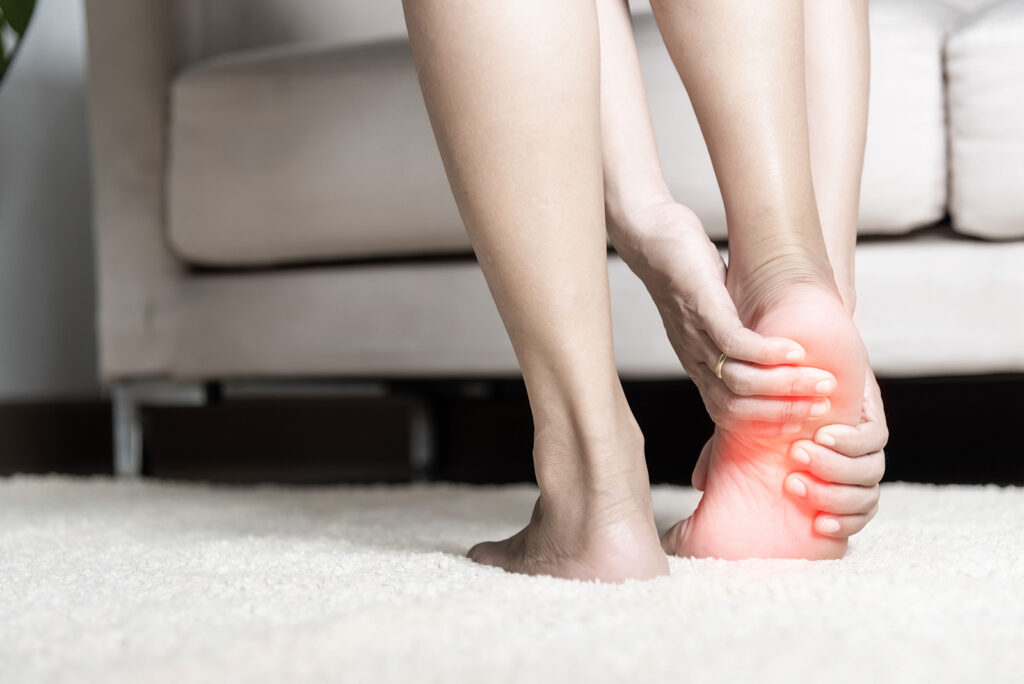
Have you ever experienced the moment as a child when your mom or dad told you not to touch the stove, but your hands somehow found themselves inching closer and closer to the heat source until something in your brain yelled at you to stop before you hurt yourself?
Pain is supposed to be a warning signal our nerves send to the brain when they believe something isn’t quite right. However, if those nerves are damaged, they send signals to our brain that we are experiencing something painful when in reality, there is nothing wrong.
So how do we handle occasional nerve pain flare-ups at home, and when is it the right time to visit your pain management physician?
Keep reading to find out!
What is Nerve Pain?
Nerve pain, also called neuropathic pain or neuralgia, occurs when a disorder or health condition affects the nerves that carry sensations to the brain. Nerve pain can present itself in many forms, from sharp, stabbing pain to an electric or burning sensation.
Signs and Symptoms of Neuropathic Pain
Nerve pain can present one or more of the following symptoms, including:
- Extreme sensitivity to touch (Allodynia)
- Extreme or increased pain sensation (Hyperalgesia)
- Decreased pain response
- Difficulty sleeping
- Electric shock-like pain
- Reduced muscle strength
- Increased sensitivity to cold
Once a nerve becomes damaged, it is more likely to start behaving abnormally. The nerve itself may become quiet and not send any pain signals, or it may send false pain messages when no pain is present.
Nerve damage can interfere with aspects of your daily life, such as sleep, work, and exercise, making activities and your daily routine an unexplainable challenge.
What Causes Nerve Pain?
Nerve pain is typically caused by an injury or disease directly affecting your central nervous system or the nerves that run to your muscles and other organs.
Common causes that could result in neuropathic pain include:
- An injury to the brain, spine, or nerves
- Alcoholism
- Vitamin B12 or Thiamine deficiency
- Phantom pain after an amputation
- Chemotherapy medication
About 30% of neuropathy cases occur as a result of diabetes; however, various diseases other than diabetes could be the underlying cause behind your neuropathic pain. The most common diseases associated with this pain include:
- Shingles
- HIV/ AIDS
- Stroke
- Carpal tunnel syndrome
- Sciatica
- Peripheral neuropathy
- Complex regional pain syndrome
- Multiple sclerosis
Tips for Coping with Nerve Pain Flare-Ups at Home
Oftentimes, the last thing we want to turn to during bouts of a flare-up is habit-forming medication or the potential need for surgery. When dealing with pain flare-ups at home, several strategies and lifestyle changes may be able to help you move through the pain before visiting a pain management clinic near you.
Build a Flare-Up Action Plan
Building a pain flare-up action plan will help you feel more prepared and in control when the time comes. Find ways to soothe the pain, such as taking a warm bath or using a heating pad. Engage in relaxation and mindfulness activities to help keep your mind off of the pain sensations.
Keep an Activity/Trigger Diary
An activity or trigger diary is a good way to keep track of your daily activities while accounting for your pain flare-ups. Over time, you may begin to notice that flare-ups are more common after you engage in a certain activity, such as gardening.
Regular Exercise
Now we don’t mean you have to start running a mile every day or hitting the gym for hours at a time. Try making small amounts of gentle exercise part of your everyday routine. By pacing yourself, it will help keep you moving without overdoing it.
Develop a Sleep Routine
Sleep is an important part of our lives, but living with nerve pain that is often more active at night can make it challenging. Increase the potential for a good night’s sleep by developing a nighttime routine. This may look like a consistent bedtime and limiting caffeine intake in the afternoon.
When Should I See a Doctor?
Whether you are suffering from nerve pain after surgery or unexplained nerve pain in the knee, pain is not something that should be ignored.
Chronic pain flare-ups could be indicative of an underlying disease or condition that won’t be solved with a heating pad at home. By seeking the help of a clinic for pain management in Charleston, SC, they can help rule out conditions or diseases that may be causing your nerve pain and develop a personalized treatment approach.
Nervous about the possibility of surgery or habit-forming medication? Our physicians believe in interventional pain management techniques, which focus on nerve blocks, medical massage, and other forms of non-intrusive techniques for relief.
Finding Relief with the Pain Specialists of Charleston

Living with nerve pain flare-ups can be debilitating, especially when they go unexplained. At Pain Specialists of Charleston, we offer the latest in interventional treatments to alleviate and manage your chronic pain and help you reclaim your quality of life.
Schedule an appointment with us today to find relief and get back to a life without pain!
Request Appointment | Contact Us | Meet Pain Doctors | Visit Us
Additional Helpful Articles:
What Should I Expect During My First Pain Management Appointment?
Interventional Pain Management: Everything You Need to Know
What Does a Pain Management Physician Do?
What’s the Best Leg Pain Treatment Without Surgery?
Can Ozempic Cause Muscle Pain?
Why Do Side Sleepers Wake Up to Shoulder Pains?
What are the Reasons for Random Pains in My Buttocks?
Charley Horses: Understanding the Pesky Midnight Muscle Spasms
Can’t Sit or Stand Without Pain? Gluteal Tendinopathy May Be to Blame
How Can I Get Immediate Relief for Sciatic Pain?
Get to Know Pain Management Physicians:
Our Services:
Diagnosis | Treatment | Interventional Pain Management | TRICARE | Wellness | Clinical Trials | Worker’s Compensation | Neurology | Imaging/ MRI
Published October 2024
